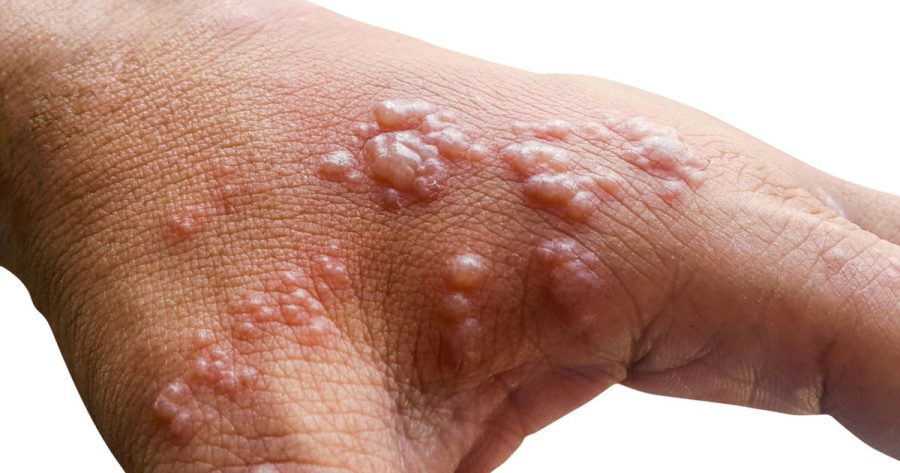World Health Organization forecast 27,000 cases of Monkeypox
Skin infected Herpes zoster virus on the arms
October 1, 2022
On 23 July, the World Health Organization officially designated monkeypox as a “public health emergency of international concern.” Currently only COVID-19 and polio are on that list. At least 75 countries have reported over 16,000 cases so far. The WHO is forecasting that there could be over 27,000 cases across 88 countries by next week, with case numbers doubling every two weeks.
The WHO decided to declare monkeypox an emergency to draw more attention to the outbreak and to spur action, including a coordinated international response. This could include investing more resources and encouraging nations to share vaccines, treatments, and other resources to contain outbreaks.
At Alabama State University, the ASU Health Services office offered Monkeypox and Covid vaccinations to students and members of the local community. The event was held in the John Garrick Hardy Center Ballroom and the scene was complete with soothing music and faculty equipped to answer any questions and concerns that the participants had.
Unlike COVID-19, monkeypox has a very low fatality rate (there have only been five reported deaths during this most recent outbreak). It can generally be treated just by managing symptoms. There’s an antiviral drug called Tecovirimat (or TPOXX) that is occasionally used for severe cases. There’s also a vaccine. The Jynneos vaccine protects against smallpox and monkeypox. It can help reduce symptoms, even if taken after exposure.
But, just like COVID-19 and other health crises, access to medicines is not currently equal, and some countries have limited or no access to vaccines and treatments. Many students and faculty at ASU have already been vaccinated for COVID-19, but not as many report being vaccinated for the Monkeypox virus or receiving a booster for the COVID vaccine, as it is still fairly new to public opinion and many people still don’t know how to feel about the vaccines overall. In addition, there are many misconceptions surrounding Monkeypox with people believing it to be exclusively a sexually transmitted disease.
According to the Centers for Disease Control and Prevention (CDC), Monkeypox symptoms usually start within 3 weeks of exposure to the virus. Contact with body fluids or infected skin lesions is the most common form of transmission. The virus can be found in bodily fluids and the rash that forms during infection and be transferered through physical contact like hugging, rubbing or sexual intercourse.
The Monkeypox illness typically lasts 2-4 weeks. Symptoms include fever, chills, swollen lymph nodes, exhaustion, muscle aches and backache, headache, and respiratory symptoms.
Vaccination against COVID-19 will reduce the risk of becoming seriously ill and dying, since the person will be better protected. Immunity will not be 100%, since a vaccinated person can still catch the disease; however, the consequences for the body are expected to be much less. Similarly booster vaccines maximize protection, particularly for those at high risk of contracting illness.
Janiya Carter, freshman, biology major got the Pfizer booster shot. “My mom works in the hospital so all of the deadly cases that she has seen have been kind of traumatic,” Carter said. “I got it as a precaution so I could be as safe as possible.”
According to the CDC, vaccination is a simple, safe and effective way to protect against illnesses before coming into contact with them, as it activates the body’s natural defenses to learn, to resist specific infections and strengthen the immune system.
“I feel like events like this encourage students to get vaccinated because it makes it so accessible to the community and allows them to be more educated on the illnesses and how it can affect people.” said junior political science major Desiree Thomas.
Nurse Bell, a nurse who administered many of the vaccines urged participants to be proactive in their health and provided post vaccination guidelines that included some rare symptoms such as stiff arm, muscle weakness and dizziness.
Members of the local community also appreciated the efficiency of the clinic provided by ASU.
“I like how easy it was to sign in and be accommodated so quickly,” said 73 year old Montgomery native, Yvette James. “The clinic is so great for the community because it brings awareness to the vaccines and makes it easy to get. Sometimes you may not have time to visit the doctor’s office and insurance doesn’t cover everything. The sign was easy for everyone to understand. I got my Pfizer vaccine today. Hopefully, they have another clinic soon so that I can get my booster.”







